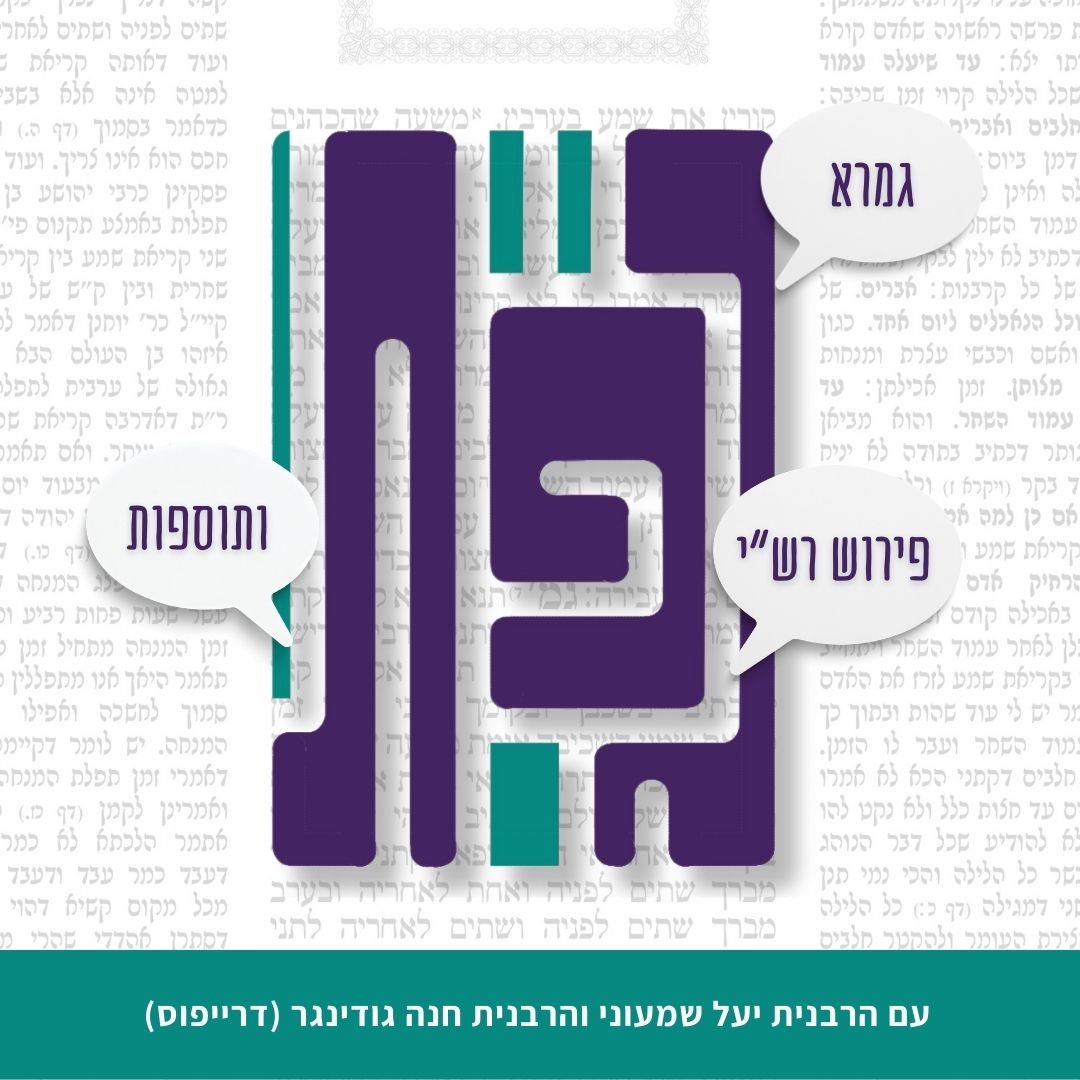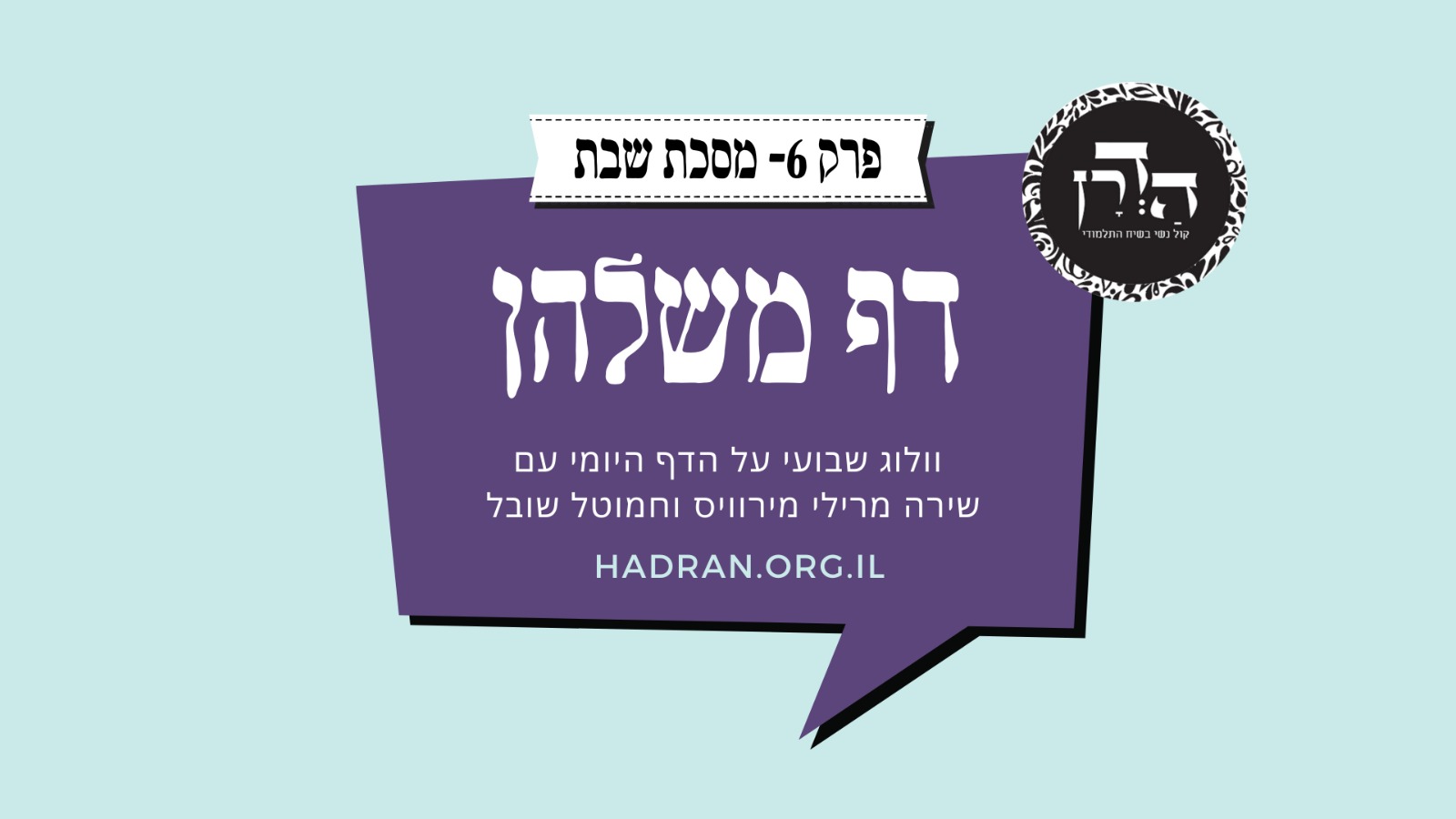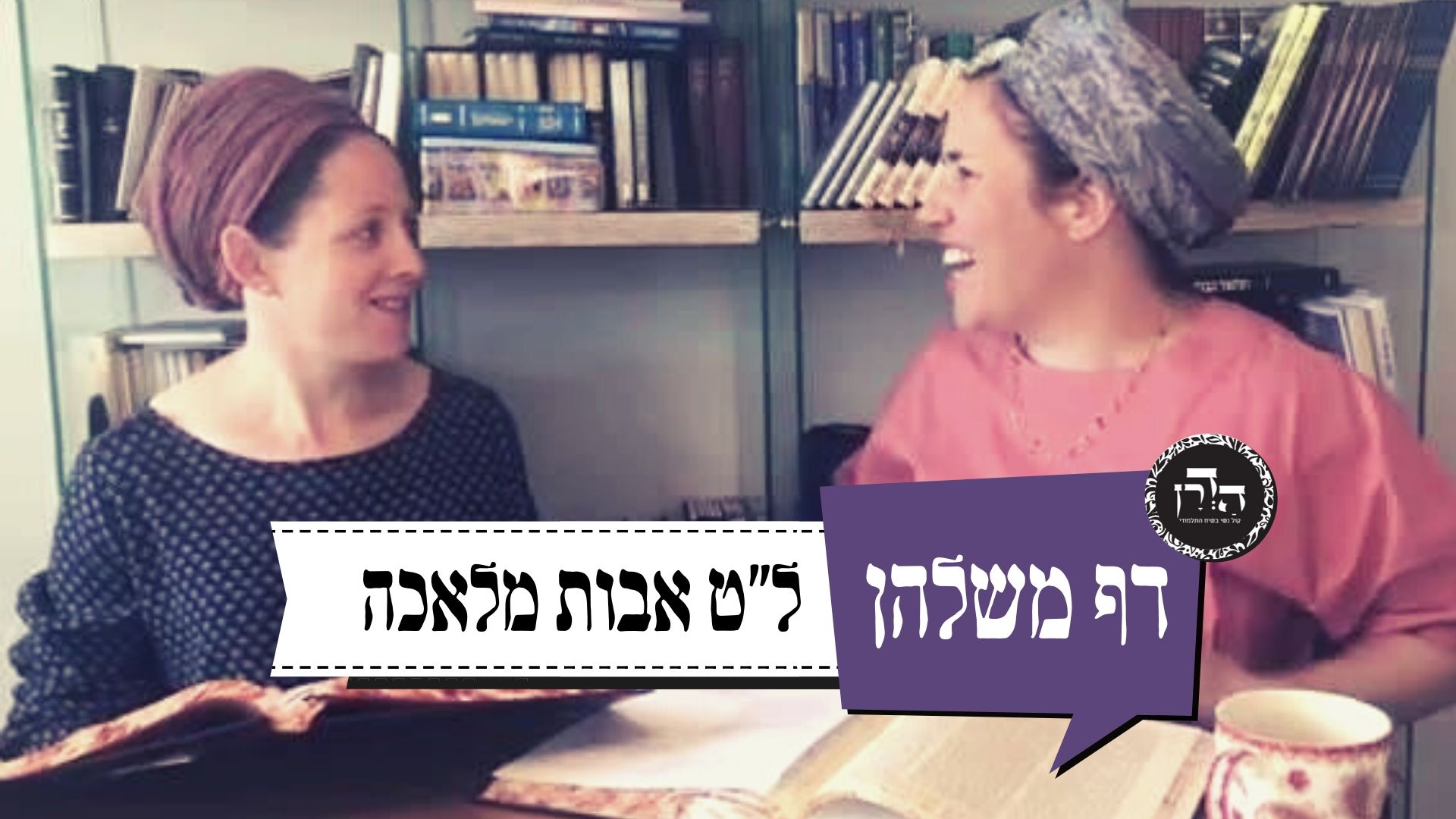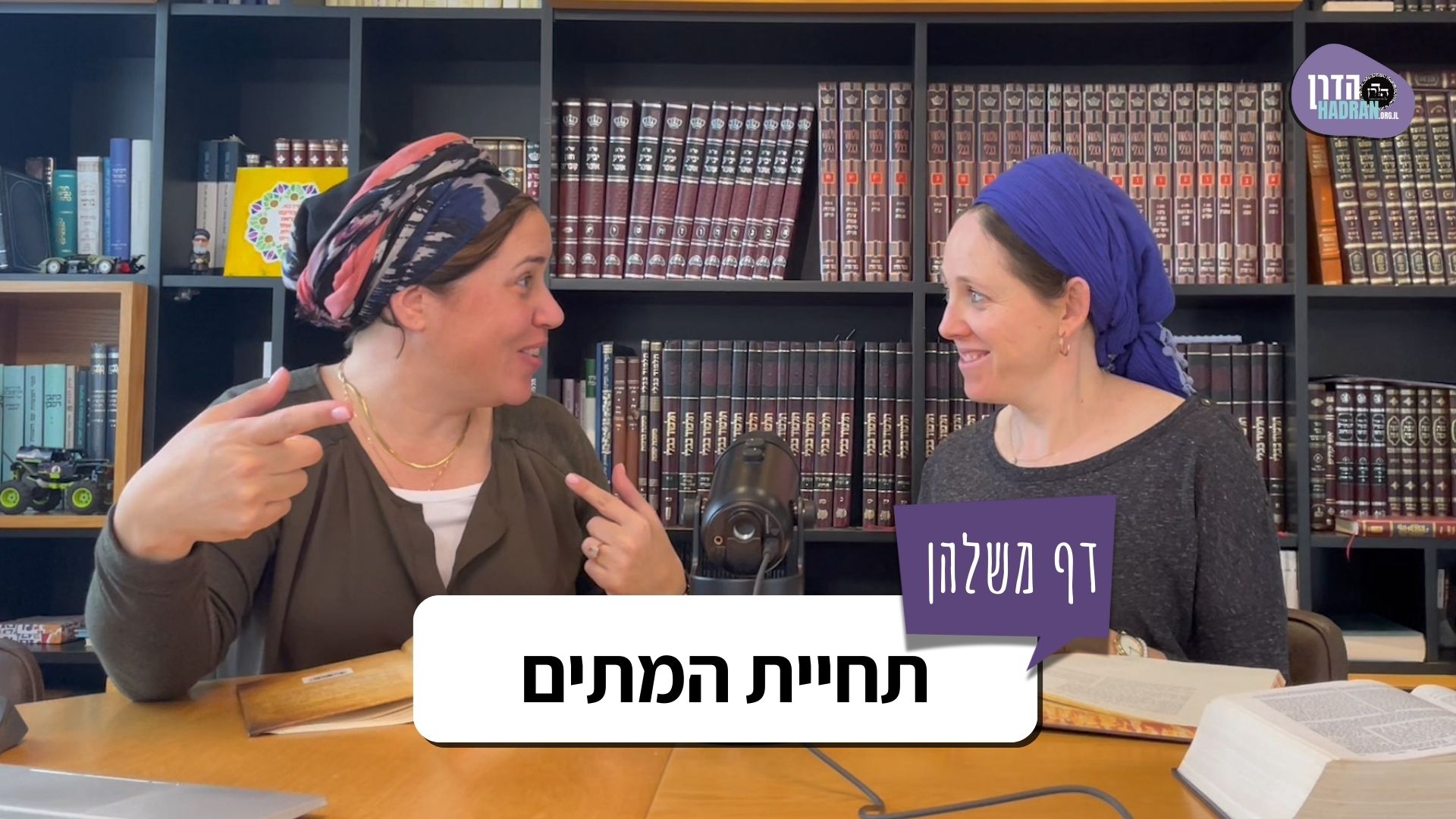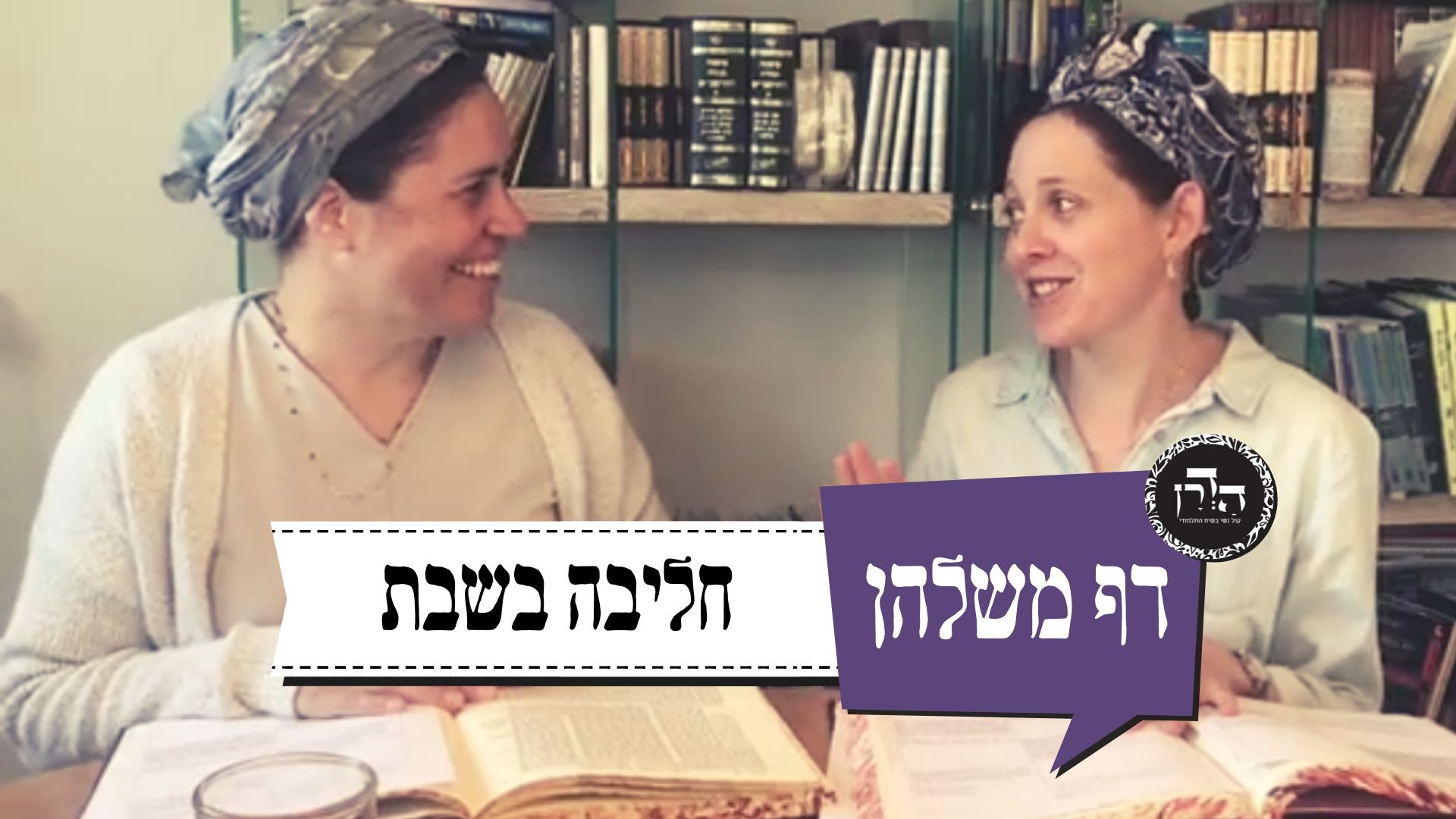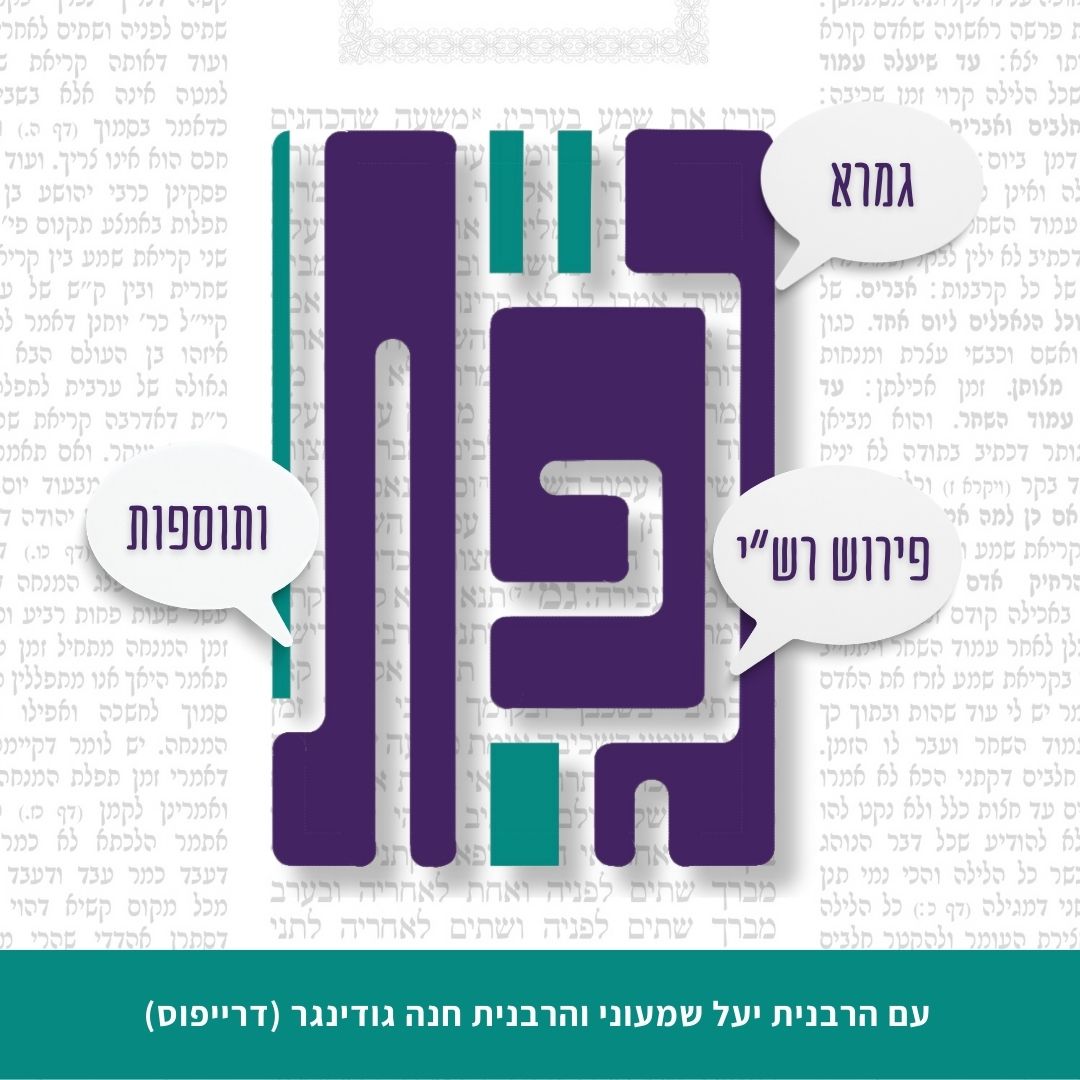האם מצוות שילוח הקן נחשב מצוות לאו הניתק לעשה? האם השילוח מתקן את העבירה אם לקח את האם? למה יוני שובך ויוני עלייה נחשבים לא רשות הבעלים לעניין שילוח הקן אבל אם מישהו גוזל אותם, חייבים משום דרכי שלום להחזירם?
הלימוד החודש מוקדש לרפואת פיליס הכט, גיטל פעשא בת מאשה רחל על ידי חברותיה הרבות שאוהבות ומעריכות אותה.
רוצה להקדיש שיעור?

כלים
הלימוד החודש מוקדש לרפואת פיליס הכט, גיטל פעשא בת מאשה רחל על ידי חברותיה הרבות שאוהבות ומעריכות אותה.
כלים
העמקה
רוצה להבין מה באמת קורה מתחת לפני השטח של הסוגיה?
שיעורים, פודקאסטים והרחבות של מיטב המורות שלנו יפתחו לך עוד זוויות וכיווני חשיבה.
חדשה בלימוד הגמרא?
זה הדף הראשון שלך? איזו התרגשות עצומה! יש לנו בדיוק את התכנים והכלים שיעזרו לך לעשות את הצעדים הראשונים ללמידה בקצב וברמה שלך, כך תוכלי להרגיש בנוח גם בתוך הסוגיות המורכבות ומאתגרות.
פסיפס הלומדות שלנו
גלי את קהילת הלומדות שלנו, מגוון נשים, רקעים וסיפורים. כולן חלק מתנועה ומסע מרגש ועוצמתי.
חולין קמא
ליתני רובדי אילן וכ”ש מעופפת מעופפת איצטריך ליה דאפי’ כנפיה נוגעות בקן פטור מלשלח
let the baraita teach that one is exempt in a case where the bird is sitting between two tree branches, which resembles a case where the bird is resting upon the nest itself in that the bird is sitting in both cases, and it would be clear all the more so that one is exempt if the mother is hovering. The Gemara responds: It was necessary for the baraita to teach the case of a hovering bird in order to teach that even if its wings are touching the nest, one is exempt from sending away the mother bird. Had the baraita taught the exemption in a case of a bird resting between two tree branches, one might have thought that this is because the bird’s wings are not touching the nest.
והאנן תנן בזמן שכנפיה נוגעות בקן חייב לשלח אמר רב יהודה כי קתני מתניתין בנוגע מן הצד:
The Gemara now questions the baraita itself: How can the baraita state that even if the hovering bird’s wings are touching the nest, one is exempt from sending the bird? But didn’t we learn in the mishna: When its wings are touching the nest, one is obligated to send away the mother? Rav Yehuda said: When the case of the hovering mother bird is taught in the baraita, it is referring to a bird touching the nest from the side. In such a case, one is exempt because its wings are not touching the nest from above. By contrast, the mishna is referring to a case where the bird is hovering directly above the nest and touching the nest with its wings from above.
אין שם אפרוח וכו’: א”ל ההוא מרבנן לרבא אימא איפכא אין שם אפרוח אלא אחד או ביצה אחת פטור מלשלח דבעינן אפרוחים או ביצים וליכא
§ The mishna teaches: Even if there is only one fledgling or one egg, one is obligated to send away the mother, as it is stated: “If a bird’s nest happens before you” (Deuteronomy 22:6), indicating that one is obligated to send the mother bird away from the nest in any case. Additionally, if there were fledglings capable of flying or unfertilized eggs, one is exempt from sending away the mother bird, as it is stated in the same verse: “And the mother is resting upon the fledglings or upon the eggs.” From the juxtaposition of the fledglings and the eggs, one derives that the eggs or fledglings must be capable of living and they must require their mothers. With regard to this, one of the Sages said to Rava: Say the opposite, that if there is only one fledgling or one egg, one is exempt from sending away the mother, since we require that the mother be “resting upon the fledglings or upon the eggs,” and this condition is not fulfilled with fewer than two.
היו שם אפרוחים מפריחים או ביצים מוזרות חייב לשלח שנאמר קן קן מכל מקום אם כן נכתוב קרא והאם רובצת עליהם מאי (דברים כב, ו) והאם רובצת על האפרוחים או על הביצים לאקושי אפרוחים לביצים וביצים לאפרוחים:
Additionally, if there were fledglings capable of flying or unfertilized eggs in the nest, say that one is obligated to send the mother bird away, as it is stated in that verse: “Nest,” indicating that one is obligated to send the mother bird away from the nest in any case. Rava responds: If so, let the verse write: And the mother is resting upon them. For what reason does the verse state: “And the mother is resting upon the fledglings or upon the eggs”? It is to compare the fledglings to the eggs and the eggs to the fledglings, i.e., to indicate that the eggs or fledglings must be capable of living and must require their mothers. Fledglings that can fly and unfertilized eggs are therefore not included in the mitzva. Consequently, the word “nest” serves to indicate that one is obligated to send away the mother bird even if there is only one egg or fledgling in the nest.
מתני׳ שלחה וחזרה אפי’ ארבעה וחמשה פעמים חייב שנאמר (דברים כב, ז) שלח תשלח את האם אמר הריני נוטל את האם ומשלח את הבנים חייב שנאמר שלח תשלח את האם נטל את הבנים והחזירן לה ואח”כ חזרה האם עליהן פטור מלשלח:
MISHNA: If one sent away the mother bird and it returned to rest on the eggs, even if it returned four or five times, one is obligated to send it away again, as it is stated: “You shall send [shalle’aḥ teshallaḥ] the mother” (Deuteronomy 22:7). The doubled verb indicates that one must send away the mother bird multiple times if needed. If one said: I am hereby taking the mother and sending away the offspring, he is still obligated to send away the mother even if he sent away the offspring, as it is stated: “You shall send the mother.” If one sent away the mother and took the offspring and then returned them to the mother’s nest, and thereafter the mother returned and rested upon them, one is exempt from sending away the mother bird.
גמ׳ א”ל ההוא מרבנן לרבא ואימא שלח חדא זימנא תשלח תרי זימנין
GEMARA: The mishna teaches that if the mother bird returned to rest on the eggs, even if it returned four or five times, one is obligated to send it away again, as it is stated: “You shall send [shalle’aḥ teshallaḥ].” With regard to this, one of the Sages said to Rava: But say instead that the word “shalle’aḥ” indicates that one must send away the mother once, and the word “teshallaḥ” indicates that one must do so twice, and beyond that there is no obligation.
א”ל שלח אפילו מאה פעמים תשלח אין לי אלא לדבר הרשות לדבר מצוה מנין ת”ל תשלח מכל מקום
Rava said to him: Actually, the halakha that one must send away the mother multiple times is not derived from the phrase “shalle’aḥ teshallaḥ.” Rather, the word “shalle’aḥ” indicates that one must send away the mother bird even one hundred times, and the word “teshallaḥ” teaches another matter: I have derived only the obligation to send away the mother bird in a case where one takes the eggs or the fledglings and wants to take the mother bird for a discretionary purpose, e.g., to eat it. In a case where one takes the eggs or the fledglings and needs the mother bird for a matter involving a mitzva, e.g., the purification of a leper, from where is the halakha that he must send away the mother derived? The verse states: “Teshallaḥ,” to teach that in any case one must send away the mother bird.
א”ל ר’ אבא בריה דרב יוסף בר רבא לרב כהנא אלא טעמא דכתב רחמנא תשלח הא לאו הכי הוה אמינא לדבר מצוה לא עשה ולא תעשה הוא ואין עשה דוחה לא תעשה ועשה
Rabbi Abba, son of Rav Yosef bar Rava, said to Rav Kahana: But according to this explanation, the only reason that one must send away the mother bird even when needed for a matter involving a mitzva is that the Merciful One wrote: “Teshallaḥ”; but if not for this, I would say that when the mother is needed for a matter involving a mitzva, one is not obligated to send her away. But this is difficult, as the sending of the mother bird is both a positive mitzva and a prohibition, as the verse states: “You shall not take the mother with the young; you shall send the mother” (Deuteronomy 22:6–7), and there is a principle that a positive mitzva cannot override both a prohibition and a positive mitzva.
לא צריכא דעבר ושקלה לאם דלאו עבריה עשה הוא דאיכא ליתי עשה ולידחי עשה קמ”ל
Rav Kahana replied: No, the word “teshallaḥ” is necessary for a case where one transgressed and took the mother with the fledglings. In such a case, he has already transgressed the prohibition, and there is now only a positive mitzva to send away the mother. Perhaps one might say: Let the positive mitzva performed with the mother, e.g., the purification of the leper, come and override the positive mitzva of sending away the mother. Therefore, the word “teshallaḥ” teaches us that this is not so, and one is obligated to send away the mother.
הניחא למאן דתני קיימו ולא קיימו
The Gemara notes: This works out well according to the one who teaches that the criterion for determining whether one is flogged for violating a prohibition that entails fulfillment of a positive mitzva is whether he fulfilled the mitzva immediately afterward or did not fulfill it. If he does not fulfill the mitzva immediately, he is flogged when he fails to do so. Consequently, if one does not send away the mother bird immediately after taking her with the fledglings, he has immediately violated the prohibition, and only the requirement to fulfill the positive mitzva remains.
אלא למאן דתני בטלו ולא בטלו כמה דלא שחטה לא עבריה ללאו
The Gemara continues: But according to the one who teaches that the criterion for determining whether one is flogged in that case is whether he negated the possibility of fulfilling the positive mitzva or did not negate it, and one is flogged only if he performed an action that renders it impossible to fulfill the mitzva, this explanation does not work out well. After all, as long as one has not slaughtered the mother bird, he has not transgressed the prohibition, since he may still send her away. Consequently, even if one takes the mother, as long as he has not slaughtered her, the prohibition remains in addition to the positive mitzva. If so, there is no need for the Torah to teach that the obligation to send away the mother bird applies in the case of a mitzva.
ותו לר’ יהודה דאמר שלח מעיקרא משמע אפי’ עשה נמי ליכא
And furthermore, one may ask: According to the opinion of Rabbi Yehuda, who said that the word “shalle’aḥ” indicates that the mitzva to send away the mother bird applies only at the outset, i.e., before taking the fledglings, one who takes the mother together with the fledglings violates both the prohibition and the positive mitzva associated with it, such that even a positive mitzva does not remain.
אלא אמר מר בר רב אשי כגון שנטלה על מנת לשלח דלאו ליכא עשה הוא דאיכא וליתי עשה ולידחי עשה
Rather, Mar bar Rav Ashi said: The word “teshallaḥ” is necessary to indicate that the mitzva to send away the mother bird applies in a case where one took her in order to send her away immediately. In such a case, there is no prohibition, as one intends to send her away, but there is still a positive mitzva to send her away. And therefore, one might have said: Let another positive mitzva, e.g., taking the mother for the purification of a leper, come and override the positive mitzva of sending the mother. Therefore, the word “teshallaḥ” indicates that the mitzva of sending the mother bird applies even in such a case.
מאי אולמיה דהאי עשה מהאי עשה סלקא דעתך הואיל ואמר מר גדול שלום שבין איש לאשתו שהרי אמרה תורה שמו של הקב”ה שנכתב בקדושה ימחה על המים
The Gemara asks: What is the strength of that other positive mitzva over this positive mitzva of sending away the mother bird? Why might the former override the latter? The Gemara responds: It might enter your mind to say that since the Master said: Great is peace between a man and his wife, as the Torah said that the name of the Holy One, Blessed be He, which is written in sanctity, shall be erased on the waters as part of the ritual of a woman suspected by her husband of adultery (see Numbers 5:23) in order to clear her from suspicion and restore peace between her and her husband, therefore, perhaps the halakha should be more lenient with regard to the leper.
והאי מצורע כיון דכמה דלא מטהר אסור בתשמיש המטה דכתיב (ויקרא יד, ח) וישב מחוץ לאהלו שבעת ימים אהלו זו אשתו מכאן שאסור בתשמיש המטה מהו דתימא כיון דאסור בתשמיש המטה ליתי עשה דידיה ולידחי עשה דשלוח הקן קמ”ל:
The Gemara explains: And with regard to this leper, since as long as he is not purified he is prohibited from engaging in marital relations, as it is written: “But he shall dwell outside his tent seven days” (Leviticus 14:8), and when the verse states: “His tent,” this is referring to his wife, such that one may derive from here that a leper is prohibited from engaging in marital relations, perhaps his purification ceremony should take precedence. This is because perhaps you will say: Since he is prohibited from engaging in marital relations, let his positive mitzva of purification come and override the positive mitzva of the sending away of the mother bird from the nest. Therefore, the word “teshallaḥ” teaches us that even so, one may not take the mother bird.
מתני׳ הנוטל אם על הבנים ר’ יהודה אומר לוקה ואינו משלח וחכמים אומרים משלח ואינו לוקה זה הכלל כל מצות לא תעשה שיש בה קום עשה אין לוקין עליה:
MISHNA: With regard to one who takes the mother bird with its fledglings, Rabbi Yehuda says: He is flogged for taking the mother bird, and he does not send away the mother. And the Rabbis say: He sends away the mother and is not flogged, as this is the principle: With regard to any prohibition that entails a command to arise and perform a mitzva, one is not flogged for its violation.
גמ׳ בעי רבי אבא בר ממל טעמא דרבי יהודה משום דסבר לאו שניתק לעשה לוקין עליו
GEMARA: The mishna teaches that according to Rabbi Yehuda, one who takes the mother with the offspring is flogged. With regard to this, Rabbi Abba bar Memel raises a dilemma: Is the reasoning for the ruling of Rabbi Yehuda that he holds that one is flogged for violation of a prohibition that entails fulfillment of a positive mitzva? Accordingly, one is flogged for transgressing the prohibition: “You shall not take the mother with the young,” which entails the fulfillment of: “You shall send the mother.”
או דלמא בעלמא סבר לאו שניתק לעשה אין לוקין עליו והכא היינו טעמא משום דקסבר שלח מעיקרא משמע
The second possibility is now presented: Or perhaps in general Rabbi Yehuda holds that one is not flogged for violation of a prohibition that entails fulfillment of a positive mitzva; and here, this is the reason one is flogged for taking the mother: It is because he holds that when the verse states: “You shall send the mother [shalle’aḥ teshallaḥ]” (Deuteronomy 22:7), the word “shalle’aḥ” indicates that the mitzva to sending the mother bird applies only at the outset, i.e., when encountering the nest. Accordingly, this is not a case of a prohibition that entails the performance of a positive mitzva, but an independent prohibition, for which one is liable to receive lashes.
תא שמע גנב וגזלן ישנן בכלל מלקות דברי רבי יהודה והא הכא דלאו שניתק לעשה הוא דרחמנא אמר (ויקרא יט, יג) לא תגזול (ויקרא ה, כג) והשיב את הגזלה שמע מינה טעמא דר’ יהודה משום דקסבר לאו שניתק לעשה לוקין עליו
The Gemara suggests: Come and hear a resolution to the dilemma from that which is taught: A thief and a robber are included among those who are liable to receive lashes by Torah law. A thief violates the prohibition of: “You shall not steal” (Leviticus 19:11), and a robber violates the prohibition of: “You shall not rob” (Leviticus 19:13); this is the statement of Rabbi Yehuda. The Gemara continues: But here, the prohibition against robbing is a prohibition that entails fulfillment of a positive mitzva, as the Merciful One states: “You shall not rob” (Leviticus 19:13), and: “And he shall restore the robbed item” (Leviticus 5:23). And nevertheless, Rabbi Yehuda deems one liable to receive lashes for transgressing the prohibition against robbing. Therefore, conclude from it that the reasoning of the ruling of Rabbi Yehuda in the mishna is that he holds that one is flogged for violation of a prohibition that entails fulfillment of a positive mitzva.
אמר ליה ר’ זירא לאו אמינא לכו כל מתניתא דלא תניא בי
Rabbi Zeira said to him: Didn’t I already tell you that any baraita that is not taught in the study hall
רבי חייא ובי רבי אושעיא משבשתא היא ולא תותבו מינה בי מדרשא דלמא אינה בכלל מלקות ארבעים תניא
of Rabbi Ḥiyya or the study hall of Rabbi Oshaya, who were precise in the formulation of their baraitot, is corrupted, and you may not raise objections based upon it in the study hall? Since this baraita was not taught in either of the aforementioned study halls, you may not cite it as proof. After all, perhaps the phrase: Are not included among those who are liable to receive forty lashes by Torah law, was taught by Rabbi Yehuda in the baraita, but the text was corrupted. It is therefore possible that according to Rabbi Yehuda, one is not flogged for violation of a prohibition that entails fulfillment of a positive mitzva, and his reasoning of his ruling in the mishna is that the word “shalle’aḥ” indicates that the mitzva to send away the mother bird applies only at the outset.
ת”ש דתני ר’ אושעיא ור’ חייא (דברים כד, יט) לא תשוב ושב (ויקרא יט, ט) לא תכלה וכלה ישנן בכלל מלקות ארבעים דברי רבי יהודה
The Gemara suggests: Come and hear a resolution from that which is taught in a baraita by Rabbi Oshaya and Rabbi Ḥiyya: It is written with regard to forgotten sheaves left for the poor: “When you reap your harvest in your field and forget a sheaf in the field, you shall not return to fetch it” (Deuteronomy 24:19). If one transgressed this prohibition and one returned to fetch it, he is liable to receive lashes. Likewise, it is written with regard to produce in the corner of the field [pe’a], which is given to the poor: “And when you reap the harvest of your land, you shall not wholly reap the corner of your field” (Leviticus 19:9). If one transgressed this prohibition and reaped the corner of his field, such individuals are included among those who are liable to receive lashes by Torah law. This is the statement of Rabbi Yehuda.
שמע מינה טעמיה דרבי יהודה משום דקסבר לאו שניתק לעשה לוקין עליו
The Gemara concludes the resolution: Since the mitzvot of leaving pe’a and forgotten sheaves are prohibitions that entail fulfillment of a positive mitzva, as the verse states with regard to both of them: “For the poor and for the stranger you shall leave them” (Leviticus 19:10), conclude from the baraita that the reasoning of the ruling of Rabbi Yehuda in the mishna is that he holds that one is flogged for violation of a prohibition that entails fulfillment of a positive mitzva.
דלמא התם היינו טעם דקסבר תעזוב מעיקרא משמע
The Gemara rejects this: Perhaps there, with regard to pe’a and forgotten sheaves, this is the reason that Rabbi Yehuda deems one liable to receive lashes: Because he holds that the positive mitzva: “For the poor and for the stranger you shall leave them,” indicates that these mitzvot apply only at the outset. Accordingly, these are not cases of prohibitions that entail fulfillment of a positive mitzva, but of independent prohibitions. Similarly, it is possible that the reasoning of the ruling of Rabbi Yehuda in the mishna is that the mitzva of the sending away of the mother bird applies only at the outset.
א”ל רבינא לרב אשי ת”ש (שמות יב, י) לא תותירו ממנו עד בקר וגו’ באש תשרופו בא הכתוב ליתן עשה אחר לא תעשה לומר לך שאין לוקין עליו דברי ר’ יהודה
Ravina said to Rav Ashi: Come and hear a resolution from that which is taught in a baraita: The verse states with regard to the Paschal offering: “You shall let nothing of it remain until the morning; but that which remains of it until the morning you shall burn in fire” (Exodus 12:10). The verse comes to position the positive mitzva of burning the leftover meat after the prohibition against leaving over the meat, in order to say that one is not flogged for its violation; this is the statement of Rabbi Yehuda.
ש”מ טעמא דר’ יהודה משום דקסבר שלח מעיקרא משמע ש”מ
Ravina continued: Conclude from the baraita that according to Rabbi Yehuda, one is not flogged for violation of a prohibition that entails fulfillment of a positive mitzva, and that the reasoning of the ruling of Rabbi Yehuda in the mishna is that he holds that the word “shalle’aḥ” indicates that the mitzva to send away the mother applies only at the outset. Consequently, the prohibition against taking the mother with the offspring is not one that entails fulfillment of a positive mitzva, but an independent prohibition that is punishable by lashes. The Gemara concedes: Conclude from it that this is the reasoning of Rabbi Yehuda.
א”ל רב אידי לרב אשי מתני’ נמי דיקא דקתני הנוטל אם על הבנים ר’ יהודה אומר לוקה ואין משלח ואי ס”ד טעמא דר’ יהודה לאו שניתק לעשה לוקין עליו לוקה ומשלח מבעי ליה
Rav Idi said to Rav Ashi: The language of the mishna is also precise, as it teaches: With regard to one who takes the mother with the offspring, Rabbi Yehuda says: He is flogged and there is no longer a mitzva to send away the mother. But if it enters your mind to say that the reasoning of the ruling of Rabbi Yehuda in the mishna is that one is flogged for violation of a prohibition that entails fulfillment of a positive mitzva, then Rabbi Yehuda should have said: He is flogged and sends away the mother. Rather, conclude that according to Rabbi Yehuda, this is not a prohibition that entails fulfillment of a positive mitzva.
ודלמא הכי קאמר במתני’ אין נפטר עד דמלקין ליה
The Gemara rejects this: One cannot infer anything from the language of the mishna, since perhaps this is what Rabbi Yehuda is saying in the mishna: There is still a mitzva to send away the mother, but one is not absolved of guilt for transgressing the prohibition against taking the mother until the court flogs him.
עד כמה משלחה אמר רב יהודה כדי שתצא מתחת ידו במה משלחה רב הונא אמר ברגליה רב יהודה אמר באגפיה רב הונא אמר ברגליה דכתיב (ישעיהו לב, כ) משלחי רגל השור והחמור רב יהודה אמר באגפיה דהא כנפיה נינהו
§ The mishna teaches that according to the Rabbis, if one transgressed the mitzva and took the mother bird with the young, one must send away the mother. The Gemara asks: How far from the nest must he send her? Rav Yehuda says: Far enough that she leaves his grasp and can no longer be caught immediately. The Gemara asks: In what manner does he send her away?Rav Huna says: He holds the mother by her feet and sends her away. Rav Yehuda says: He holds her by her wings [baagappeha] and sends her away. The Gemara elaborates: Rav Huna says that one holds the mother by her feet, as it is written: “That send forth freely the feet of the ox and the donkey” (Isaiah 32:20), indicating that the sending of an animal is associated with its feet. Rav Yehuda says that one holds her by her wings, because the feet of the mother bird are her wings, as it is by means of her wings that she moves about.
ההוא דגזינהו לגפה ושלחה ואח”כ תפשה נגדיה רב יהודה א”ל זיל רבי לה גדפיה ושלחה
§ The Gemara relates: A certain person clipped a mother bird’s wing and sent it away and thereafter caught it. Rav Yehuda flogged him for transgressing the prohibition: “You shall not take the mother with the young” (Deuteronomy 22:6). Rav Yehuda also said to him: Go and let its wings grow back and then send it away.
כמאן אי כר’ יהודה לוקה ואין משלח אי כרבנן משלח ואין לוקה לעולם כרבנן ומכת מרדות מדרבנן
The Gemara asks: In accordance with whose opinion did Rav Yehuda act in this case? If he acted in accordance with the opinion of Rabbi Yehuda, then there was no need to send away the mother, because according to Rabbi Yehuda, he is flogged for taking the mother bird, and he does not send away the mother. If he acted in accordance with the opinion of the Rabbis, then he should not have flogged this individual, since according to the Rabbis, he sends away the mother and is not flogged. The Gemara responds: Actually, he acted in accordance with the opinion of the Rabbis, and the lashes administered by Rav Yehuda were not for transgressing a Torah prohibition; rather, they were rabbinic lashes for rebelliousness [makkat mardut], as this individual acted inappropriately.
ההוא דאתא לקמיה דרבא א”ל תימה מהו אמר לא ידע האי גברא דעוף טהור חייב לשלוחי אמר ליה דילמא חדא ביעתא הוא דרמיא אמר ליה האי ידעי לך מתניתין היא אין שם אלא אפרוח אחד או ביצה אחת חייב לשלח
The Gemara relates that a certain man came before Rava and said to him: What is the halakha with regard to a certain kosher bird known as the teima? Is it included in the mitzva of sending away the mother bird from the nest? Rava said: Doesn’t this man know that with regard to any kosher bird one is obligated to send away the mother? The man responded: Nevertheless, I am uncertain with regard to the halakha. Rava said to him: Perhaps you are uncertain about a case where a single egg is placed in the nest, since the Torah states: “Upon the fledglings or upon the eggs” (Deuteronomy 22:6). The man replied in the affirmative. Rava said to him: That too should be known to you, as it is stated in the mishna (140b): Even if there is only one fledgling or one egg, one is obligated to send away the mother.
שלחה ואהדר לה רבא פרסתקי ותפסה וליחוש לחשדא כלאחר יד
The man sent away the bird, and Rava then surrounded her with nets [perastekei] and caught her. The Gemara asks: But shouldn’t Rava be concerned about arousing suspicion that he required the sending away of the bird only so that he might catch it for himself? The Gemara responds: The nets were positioned far from the nest in an unusual manner that did not arouse suspicion.
ת”ר יוני שובך ויוני עלייה חייבות בשלוח ואסורות משום גזל מפני דרכי שלום
§ The Sages taught in a baraita: Pigeons of a dovecote and pigeons of an attic are subject to the obligation of sending away the motherbird,because they are ownerless and therefore not considered readily available. But nevertheless, they are subject to the prohibition of robbery due to a rabbinic ordinance to maintain the ways of peace.
ואי איתא להא דאמר ר’ יוסי בר ר’ חנינא חצרו של אדם קונה לו שלא מדעתו קרי כאן כי יקרא פרט למזומן
The Gemara objects: But if it is so that this ruling is correct that Rabbi Yosei, son of Rabbi Ḥanina, says, i.e., that a person’s courtyard effects acquisition for him of an item placed in it even without his knowledge, then a dovecote or attic will effect acquisition for its owner of any eggs inside them. Accordingly, one should apply here the principle that the mitzva to send away the mother bird from the nest applies only in the case described in the verse: “If a bird’s nest happens before you” (Deuteronomy 22:6), which excludes from the mitzva a bird or egg readily available in one’s home. Yet the baraita rules that the mitzva does apply in this case.
אמר רב ביצה עם יציאת רובה הוא דאחייב בשלוח מקנא לא קני עד דתפול לחצרו וכי קתני חייבות בשלוח מקמי דתפול לחצרו
Rav says: It is from the time of the emergence of the majority of an egg from a mother bird’s body that one becomes obligated to send away the mother from the nest. On the other hand, the owner of a courtyard does not acquire the egg until it fully emerges and falls into his courtyard. And therefore, when the baraita teaches that in the case of the pigeons in a dovecote or an attic, they are subject to the obligation of sending away the mother bird, it is referring to a time before the egg falls into his courtyard.
אי הכי אמאי אסורות משום גזל אאמם ואיבעית אימא לעולם אביצה וביצה כיון דנפיק ליה רובא דעתיה עליה
The Gemara asks: If that is so, that the baraita is referring to a case where the egg has not fully emerged, why does the baraita rule that the eggs are forbidden by rabbinic law for others to take due to the prohibition of robbery? The eggs have not yet been acquired by the owner of the courtyard. The Gemara answers: That ruling of the baraita is referring to their mother, i.e., the mother bird. Or, if you wish, say instead: Actually, that ruling is referring to the egg. And the reason the Sages rendered it prohibited to take the eggs due to the prohibition of robbery is that once the majority of an egg emerges from the body of the mother bird, the owner’s mind is upon the eggs to acquire them, although technically he will not acquire them until they fully emerge.
והשתא דאמר רב יהודה אמר רב אסור לזכות בביצים שהאם רובצת עליהן שנאמר שלח את האם והדר הבנים תקח לך אפי’ תימא אע”ג דנפל לחצרו כל היכא דאיהו מצי זכי חצרו נמי זכיא וכל היכא דאיהו לא מצי זכי חצרו נמי לא זכיא ליה
The Gemara adds: And now that Rav Yehuda said that Rav said: It is prohibited to acquire eggs whose mother is resting upon them, as it is stated: “You shall send the mother,” and only then: “The young you may take for yourself” (Deuteronomy 22:7), you may even say: Even though the eggs fully emerged and fell into his courtyard, he must still send away the mother bird. This is because in any case in which a courtyard owner is capable of acquiring an item by himself, his courtyard can also effect acquisition of it for him. But in any case in which he is incapable of acquiring an item by himself, his courtyard cannot effect acquisition of it for him either. Since one is incapable of acquiring the eggs so long as the mother bird is resting upon them, one’s property does not acquire the eggs for him even if they have already fallen into it.
אי הכי אמאי אסורות מפני דרכי שלום אי דשלחה גזל מעליא הוא אי דלא שלחה שלוחי בעי
The Gemara asks: If that is so, that the baraita is referring to a case where the courtyard cannot effect acquisition of the eggs for him, why does the baraita rule: They are subject to the prohibition only due to the rabbinic ordinance to maintain the ways of peace? If one sent away the mother bird before taking the eggs, then it is full-fledged robbery by Torah law, since the courtyard has effected acquisition of the eggs on behalf of its owner, and if one did not send away the mother bird, he needs to send her away before it is permitted to take the eggs. Either way, one will have transgressed Torah law and not a rabbinic prohibition.
בקטן קטן בר דרכי שלום הוא הכי קאמר אביו של קטן חייב להחזיר לו מפני דרכי שלום
The Gemara answers: The baraita is referring to a case where a minor took the eggs without sending away the mother. A minor is not obligated in the mitzva of sending away the mother bird. The Gemara asks: Is a minor subject to a rabbinic ordinance concerning robbery enacted to maintain the ways of peace? The Gemara responds: This is what the latter clause of the baraita is saying: The father of a minor who took such eggs is obligated to return them to the owner of the dovecote or attic, due to the rabbinic prohibition concerning robbery instituted to maintain the ways of peace.
לוי בר סימון אקני פירות שובכו לרב יהודה אתא לקמיה דשמואל א”ל זיל טרוף אקן דליתגבהו וקנינהו
§ The Gemara relates an additional incident with regard to pigeons of a dovecote that were discussed above: Levi bar Simon transferred ownership of the produce of his dovecote, i.e., the fledglings and the eggs contained in it, to Rav Yehuda. Rav Yehuda came before Shmuel and told him of his acquisition. Shmuel said to him: Go, bang on the nest, i.e., the dovecote, so that the fledglings will rise up and you will acquire them.
למאי אי למקנא לקנינהו ליה בסודר אי ביום טוב
The Gemara asks: For what purpose did Shmuel tell Rav Yehuda to do this? If he meant for Rav Yehuda to finalize the acquisition so that Levi bar Simon could not retract, let him do so through acquisition by means of a cloth. There is no need for him to bang on the dovecote. If this incident occurred on the eve of a Festival, and Rav Yehuda came to ask what action to take in order to render the birds permitted for slaughter on the Festival, then banging on the dovecote should not be necessary,
